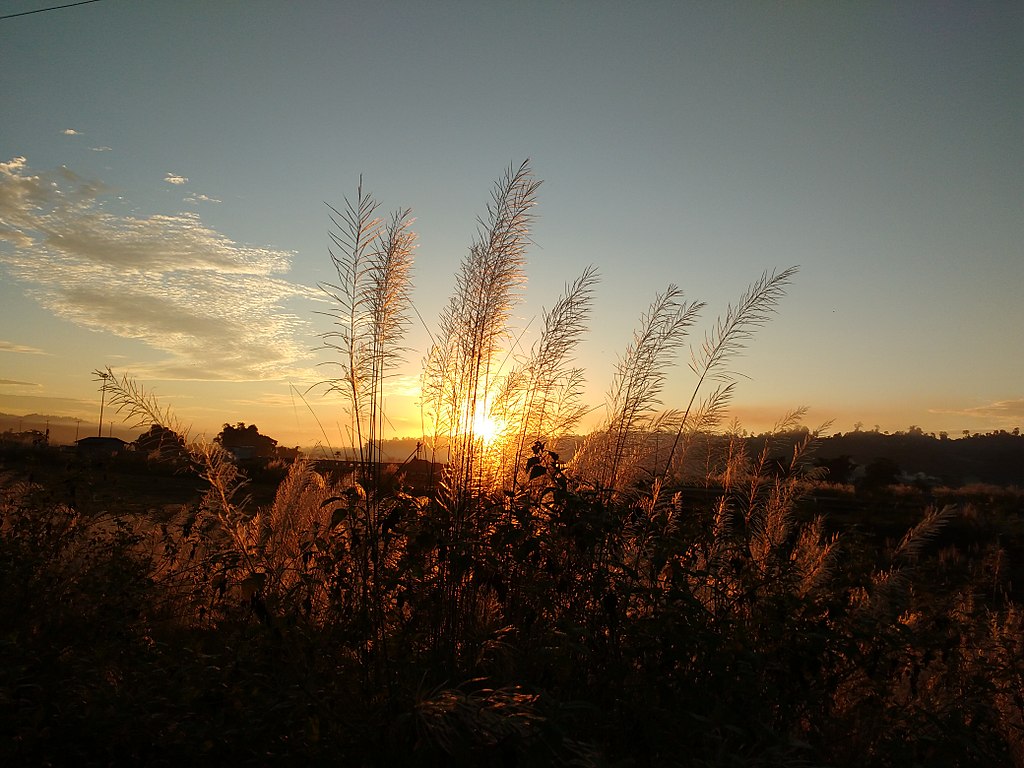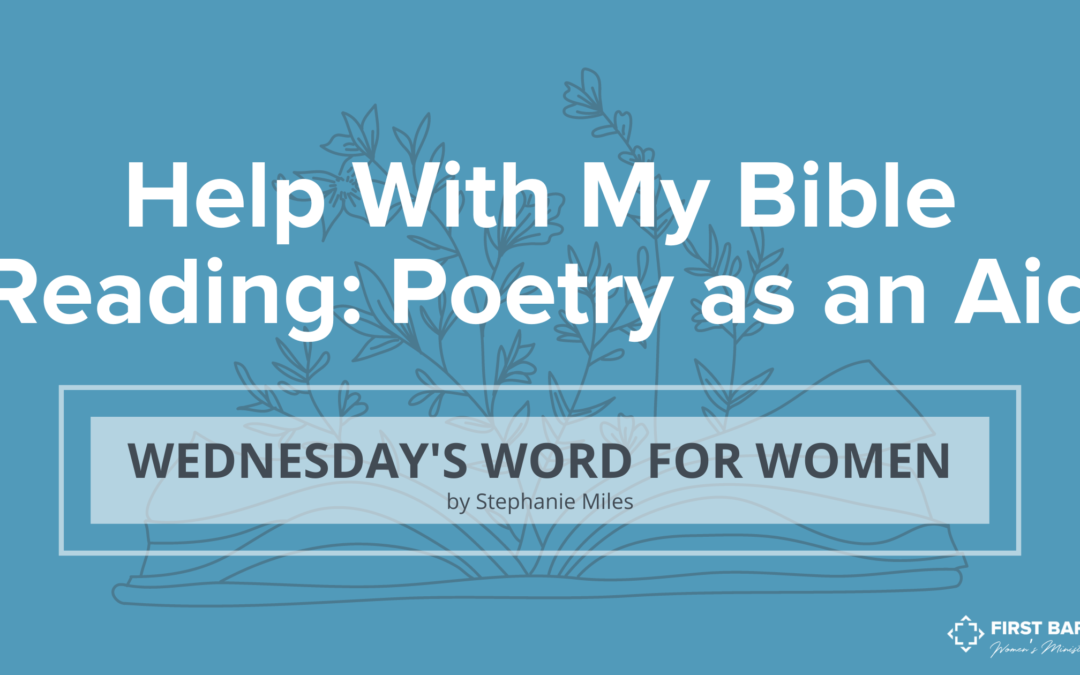Thanks, Mom

Though I love to read, I wouldn’t have called myself a lover of poetry in the past. It seemed a little esoteric and beyond reach. Little did I realize how much I needed it. My latest interest in poetry has come to me, as many things do, by my mother. Earlier this year, at my mom’s recommendation, I bought 30 Poems to Memorize before It’s Too Late, edited by David Kern. Reading it has slowly awakened me to a realization. My Bible reading is connected to the concepts in poetry reading. Of course the Bible is supreme in its purpose, function and beauty. However, there are many other beautiful and instructive things to read, and my reading poetry helps me mine for meaning in God’s word.
The Onset and Upheaval
Going back to last summer, (or was it the summer before?–all of COVID blurs together), I began to study Jeremiah. It took a significant portion of my year and even some time in Pastor Tim’s office making sense of it. The images and repetitions, analogies and laments were extensive. I later read that approximately ⅓ of the Bible is poetic, if not actual poetry (Ryken, Lesson 4, How to Read the Bible as Literature). Though poetry or poetic style is a big part of the Bible, I hadn’t begun to understand until I started reading poetry intentionally. All of God’s words give light (Ps. 36:9), but something about imagery-filled passages kindle a spark in me. I find myself transfixed by the light of God’s word, and not just the substance, though that is sufficient. Poetic form adds depth and even more beauty. The frame is lovely like the picture. The vehicle is as lovely as the journey. Simply put, a large portion of the Bible is dedicated to this figurative kind of writing, and reading poetry helps me notice and appreciate it.
You’re a Poet and Don’t Even Know It
The Oxford Dictionary defines poetry as a “literary work in which special intensity is given to the expression of feelings and ideas by the use of distinctive style and rhythm.”

Somewhere along the way, we may lose our desire to read poetry, but many of us grew up with it in the form of nursery rhymes. I repeated Old Mother Hubbard, Jack Sprat, Old MacDonald and Humpty Dumpty over and over, on swings, down the slide, and in tents made around my couches. They were fun. I didn’t always know what they meant, but I enjoyed the sound of the words rolling along my tongue. I’m pretty sure you know many of them, too. Do you know which nursery rhyme is illustrated to the left?
So why do we not make poetry reading a habit if we sing songs (basically poetry) and grow up with nursery rhymes?
During the Enlightenment (around 1600-1800), reason became prized over other pursuits. The “great divorce between reason and imagination” (Guite and Meynell, 2021) implied that the subjective was bad and the objective was good. People began believing that only what was factual or scientific was important. However, if it weren’t for imagination, we wouldn’t have the curiosity to ask questions about science to investigate in the first place. Poetry isn’t escapist and extra. It clothes the external world and experience with meaning. It provides reflection, insight and perspective we need to make valuable contributions to this world. However, enjoying poetry requires taking deliberate time and mental energy, another reason I have found that it has fallen out of favor.
The Bible and Poetry
Of all the definitions of poetry I’ve seen, American poet Rita Dove’s is my favorite. She said, “Poetry is language at its most distilled and most powerful.” God’s word helps me to understand life around me, but when I read that it is a lamp for my path(Psalm 119:105), it is powerful. It helps me understand how difficult being without it can be, and how helpful it can be in a painful situation by coupling the verse with my experience in dark places. 2 Peter 1:19 is one of my favorites, forcefully spurring me on to pay attention to the Bible as a light shining in a dark place, “until the day dawns and the morning star rises in our hearts.” This imagery reminds me that time will lapse, but the outcome is certain, like the dawn, and that God’s word imparts vision, understanding, and clarity. The feeling of hope in this verse doesn’t come from the words directly, but also the images behind the words.

We know that we can’t rely on our emotions, but we can rely on God’s, which he makes clear through His word, including poetic passages. They aren’t second tier. Reading these Bible passages as poetry and other beautiful lyric poems helps tune my emotions to His.
I’m learning that good poetry raises my awareness of Scripture to a deeper and lovelier level than I initially comprehended by noticing things like alliteration, phrasing, multiple meanings of words, repetition, imagery, line breaks, and grammar. Becoming a more attentive reader is helping me devotionally as I study God’s word. If you’re wondering what a good example might be, try this one I recently discovered by Gerard Manley Hopkins– “God’s Grandeur” :
The world is charged with the grandeur of God.
It will flame out, like shining from shook foil;
It gathers to a greatness, like the ooze of oil
Crushed. Why do men then now not reck his rod?
Generations have trod, have trod, have trod;
And all is seared with trade; bleared, smeared with toil;
And wears man’s smudge and shares man’s smell: the soil
Is bare now, nor can foot feel, being shod.
And for all this, nature is never spent;
There lives the dearest freshness deep down things;
And though the last lights off the black West went
Oh, morning, at the brown brink eastward, springs —
Because the Holy Ghost over the bent
World broods with warm breast and with ah! bright wings.
Click here for a great analysis: God’s Grandeur || Line by Line Analysis || CSEC English B
I would recommend the following for further reading on the value of poetry for our Biblical understanding:
https://www.desiringgod.org/articles/a-little-poetry-improves-a-life
https://www.desiringgod.org/articles/god-filled-your-bible-with-poems
Brandreth, Gyles. Dancing by the Light of the Moon. Sept. 4, 2019. Michael Joseph Ltd. Publishing. (This is not a Christian book, but about poetry in general, but still valuable information and a good anthology to start)
Guite, Malcolm and Mark Meynell. “Poetry Imagination’s Wake-Up Call.” Hutchmoot Podcast. Sept. 14, 2021. https://rabbitroom.com/2021/09/hutchmoot-podcast-video-poetry-imaginations-wake-up-call/
Kern, David. “30 Poems to Memorize before It Is Too Late.” June 1, 2020. Circe Books. (It includes analyses to aid in understanding each poem. This book has been a real help to me!)
Ryken, Leland. “How to Read the Bible as Literature.” https://lelandryken.com/courses/how-to-read-the-bible-as-literature/

